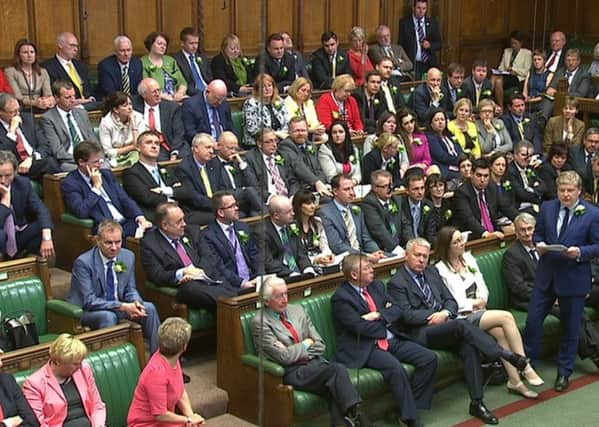Andrew Whitaker: SNP/Labour must fight austerity together


With the Tories likely to carry on piling on the austerity next year and beyond, there will be many occasions when Jeremy Corbyn’s Labour Party, with a much stronger line against cuts than the previous leadership, and the SNP, find themselves in the same voting lobbies at Westminster.
Despite seeking to annihilate Labour in Scotland, something it came close to doing by reducing the party to just one MP, the SNP leadership managed to promote itself as part of an informal anti-Tory alliance, pledging to help “lock the Tories out of power”.
Advertisement
Hide AdAdvertisement
Hide AdThat lock-out did not happen, but there was never going to be a bad result for the SNP in terms of party fortunes in May’s election, and the election of a minority Labour government dependent on nationalist support in Commons votes for its survival would have handed it power at Westminster that was once beyond its wildest dreams.
In any event the election of 56 SNP MPs, now reduced to 54, and the status of a nationalist party returned as the third-biggest political force in the Commons, when the governing Tories have just one MP in Scotland, is unprecedented in modern times.
Many in Labour, probably correctly, believe the nationalists knew exactly what they were doing when they sought to ramp up the prospect of an informal Labour-SNP pact to govern the UK.
A former Labour MP who failed to win a return to Westminster after a five-year absence told this columnist that he attributed his defeat in a Yorkshire constituency to fears expressed on the doorstep about the prospect of the SNP exercising influence over a minority government led by Ed Miliband – something ruthlessly exploited by the Tories’ campaign machine.
Of course there are other reasons for Labour’s defeat on 7 May, but the SNP “game playing” will linger long in the memories of Labour MPs as well as those from the party who failed to be elected to Westminster in 2015.
But should Chancellor George Osborne come up with more austerity initiatives resembling the recently abandoned plan to cut tax credits, Labour and the SNP who both claim to be avowedly anti-austerity may have to cooperate on some level in order to effectively stand up for those hit hardest by cuts.
For the government to lose Commons votes over austerity, all the planets would have to align for the main opposition parties, with a sufficiently high number of Tory rebels voting against the government as well as MPs from all the smaller groupings like the Northern Ireland Unionist parties.
But the SNP’s position as the third biggest party in the Commons will continue to be one of the biggest political stories, with the parliamentary muscle of the nationalists potentially critical in the event of tight votes.
Advertisement
Hide AdAdvertisement
Hide AdThe unfortunate episode when newly elected SNP MPs appeared to seek to take over the Commons seat occupied for decades by the left-wing Labour MP Dennis Skinner quite understandably got under the skin of Labour MPs.
There is also the issue of the SNP’s nine and a half years in power at Holyrood and the party presiding over its own austerity in areas like the college sectors.
However, the sheer numerical size of the party and the seemingly non-stop cuts from the Tories may mean there has to be some sort of cooperation between the two main anti-austerity parties in the Commons if either wants to have an effective presence in Westminster.